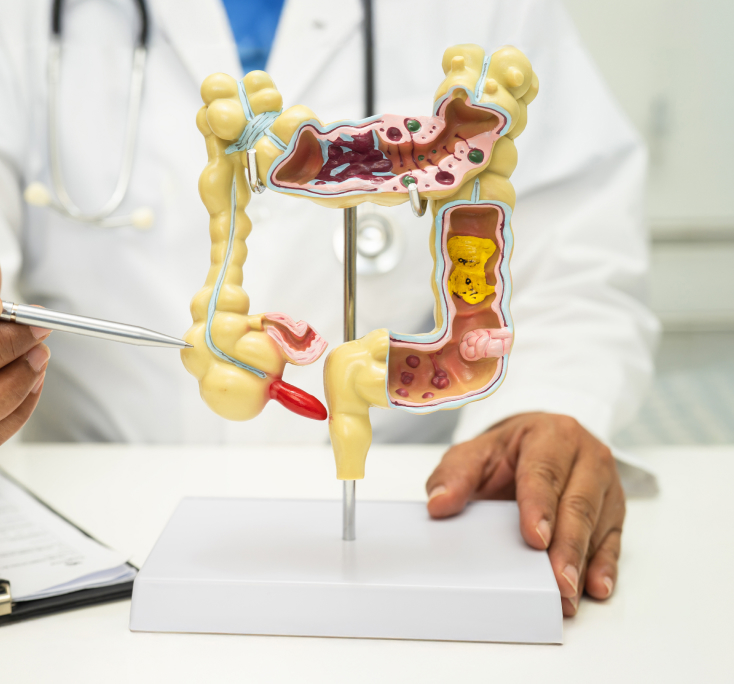Your Colorectal Health, Our Priority
With our comprehensive suite of screening services and treatment options, our experienced colorectal specialist and medical team promise you peace of mind whilst ensuring a strong and healthy colon.


What is theAppendix?
The appendix is a tubular structure at the lower end of the caecum, situated at the beginning of the colon, just below where the small intestines enter the colon. In most people, it lies in the lower right side of the abdomen.
Appendicitis occurs when there is infection or inflammation of the appendix. This is believed to be due to blockage of lumen of the appendix, usually by a lump of hard stools (called faecolith). The mucus produced by the lining of the appendix then becomes trapped and the appendix then becomes swollen. The pressure affects the blood flowing in the wall of the appendix, and eventually causes it to break and the appendix to burst open, releasing all the infected material.
If there is still no treatment, the infection usually accumulates around the area and causes a large abscess. In some cases, the body is unable to contain the abscess and the pus spreads throughout the entire abdominal cavity, causing severe infection and possibly even death.
Types of Appendicitis
- Acute Appendicitis - This is a sudden inflammation of the appendix accompanied by severe symptoms that can worsen rapidly. This condition requires prompt medical attention to prevent complications like a ruptured appendix.
- Chronic Appendicitis - Unlike the sudden and severe start of acute appendicitis, chronic appendicitis occurs with milder, on-and-off symptoms, and stays relatively constant. It is a rare condition with symptoms that may come and go over a long period, making it difficult to diagnose.
Many people underestimate how serious appendicitis can be. Please seek immediate medical attention should you experience symptoms.
Symptoms of Appendicitis
Tests For Appendicitis
Possible Complications of Appendicitis
Appendicitis Treatment
The primary treatment for appendicitis is the removal of the appendix - especially before it bursts. Rest assured that we can live well without an appendix.
Most patients are discharged within 1-2 days after surgery. However, those with severe infection or abscess from an appendix that has perforated may need to stay longer until the infection is resolved. Hence, it is important to seek treatment early when symptoms of pain arise.
After Surgery
Most patients can start drinking liquids after the surgery. They can start on a diet the next day and be discharged thereafter.
FAQs on Appendicitis
At what age does appendicitis typically occur?
How long can appendicitis go untreated?
How much does appendix surgery cost in Singapore?
How long does an appendix surgery take?
Will there be visible scars following a laparoscopic appendicectomy?
Can a person live without an appendix?
Our Colorectal SurgeonColorectal Specialist

Dr Ho Kok Sun
Consultant Colorectal & General Surgeon
MBBS (Singapore), M Med (General Surgery) (Singapore)
FRCS (General Surgery) (Edinburgh), FAM (Singapore)
Dr Ho Kok Sun has been treating appendicitis for over a decade and was the past President of the ASEAN Society of Colorectal Surgeons and the Society of Colorectal Surgeons (Singapore), as well as a founding member of the Eurasian Colorectal Technologies Association. Dr Ho was actively involved in the training of medical students and residents, and has published widely in reputable journals and book chapters. He believes that treatment should always be personalised to the patient’s needs.

